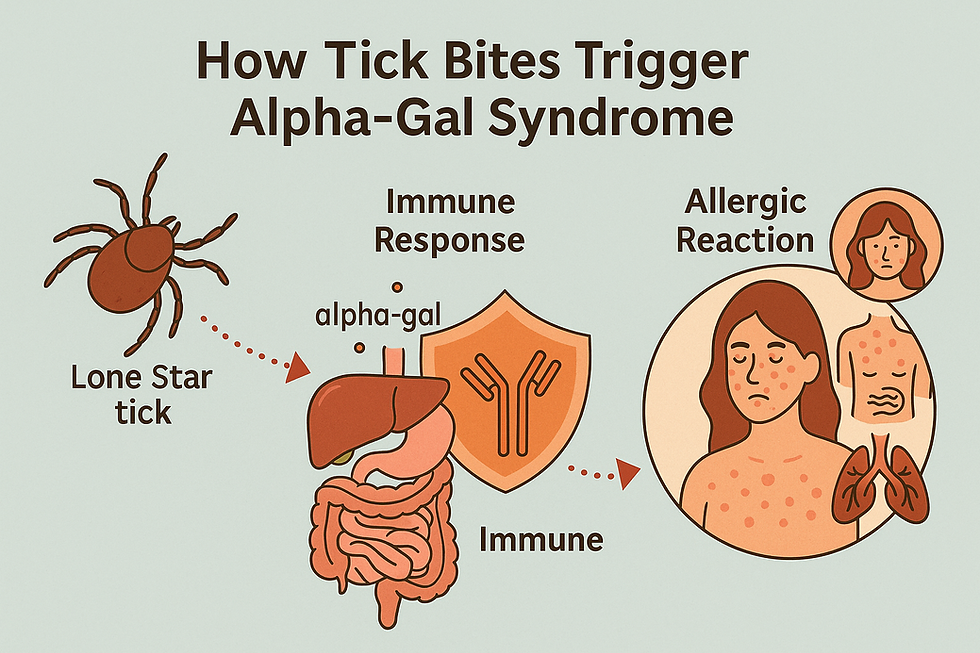🧬 Latest 2024–2025 Research on Alpha-Gal Syndrome: New Discoveries and Insights
- Jordan Concannon
- May 12
- 3 min read
Alpha-Gal Syndrome (AGS) is a tick-borne allergy to red meat and other mammalian products, characterized by a delayed allergic reaction. Recent research from 2024 and 2025 has provided new insights into the mechanisms, diagnosis, and management of AGS.

🧪 New Tick Species Implicated in AGS
While the Lone Star tick (Amblyomma americanum) has been the primary vector associated with AGS, recent studies have identified additional tick species capable of inducing the syndrome:
Blacklegged Tick (Ixodes scapularis): A case in Maine linked AGS to a bite from this species, suggesting a broader geographic risk. Health+1CDC+1
Western Blacklegged Tick (Ixodes pacificus): A case in Washington state associated AGS with this tick, expanding the known range of potential vectors. CDC+3CIDRAP+3CDC+3
These findings indicate that AGS may be more widespread than previously thought, necessitating increased awareness in regions beyond the traditional southeastern U.S.
🧬 Advances in Diagnostic Testing
Traditional AGS diagnosis relies on detecting specific IgE antibodies to alpha-gal. However, recent research has explored additional diagnostic methods:
Basophil Activation Test (BAT): This test measures the activation of basophils in response to alpha-gal exposure, providing a functional assessment of allergic response. Wiley Online Library
Monoclonal Antibody Profiling: Researchers have identified over 60 monoclonal antibodies specific to alpha-gal, offering potential for more precise diagnostics and targeted therapies. Daily Medical News+1PR Newswire+1
These advancements aim to improve the accuracy of AGS diagnosis and our understanding of individual immune responses.
🧬 Innovative Treatment Approaches
Management of AGS currently focuses on avoidance of trigger foods and emergency preparedness. However, emerging therapies are under investigation:
Nanoparticle-Based Immunotherapy: In mouse models, nanoparticles delivering alpha-gal antigens have shown promise in inducing immune tolerance, potentially preventing allergic reactions. Chemical Engineering at Michigan+1Frontiers+1
While still in early stages, such treatments could revolutionize AGS management by addressing the underlying immune response.
🧬 Medication Labeling and Patient Safety
An 81.9% increase in inquiries about animal-free medications highlights the challenges AGS patients face due to the lack of clear labeling on pharmaceutical products. Many medications contain animal-derived ingredients, posing risks for individuals with AGS.
Advocacy for transparent labeling is crucial to ensure patient safety and informed decision-making.
🧬 Public Awareness and Information-Seeking Trends
A 2024 study analyzing online search behaviors revealed a significant increase in public interest regarding AGS:JMIR+1PubMed+1
A 627% rise in alpha-gal-related searches from 2015 to 2022.PubMed+1JMIR+1
Strong correlations between searches for AGS and tick-related terms, indicating growing awareness of the tick-allergy connection. en.wikipedia.org+2PubMed+2JMIR+2
This trend underscores the importance of accessible, accurate information for both patients and healthcare providers.
As Alpha-Gal Syndrome continues to affect more people across the globe, the 2024–2025 research landscape reflects both concern and hope. With new tick species being linked to sensitization, broader geographic risks are becoming clearer.
At the same time, innovations in diagnostics and early experimental treatments like nanoparticle immunotherapy show promise for improved patient care in the future. The call for clear pharmaceutical labeling and continued education is louder than ever, as patients and healthcare providers work together to navigate this complex and often misunderstood condition.
Staying informed and engaged with the latest scientific findings is essential—not just for those living with AGS, but for the growing number of people who may one day face it.
Stay healthy friends,
Jordan
🔗 References
CDC Case Report: AGS from Blacklegged Tick in Mainehttps://wwwnc.cdc.gov/eid/article/31/4/24-1265_article
CIDRAP News Report: New Tick Species Implicated in AGShttps://www.cidrap.umn.edu/tick-borne-disease/research-ties-bites-2-more-types-ticks-red-meat-allergy
Wiley Allergy Journal: Basophil Activation Test in Alpha-Galhttps://onlinelibrary.wiley.com/doi/10.1111/all.16291
Healio Allergy News: 60+ Monoclonal Antibodies Linked to Alpha-Galhttps://www.healio.com/news/allergy-asthma/20250324/rna-sequencing-uncovers-more-than-60-monoclonal-antibodies-linked-to-alphagal-syndrome
University of Michigan Engineering: Nanoparticle Immunotherapy in Micehttps://che.engin.umich.edu/2024/08/12/tick-borne-red-meat-allergy-prevented-in-mice-through-new-nanoparticle-treatment
AAAAI: Sharp Increase in Questions About Animal-Free Medicationshttps://www.aaaai.org/about/news/news/2025/animal
Journal of Medical Internet Research: Public Interest in Alpha-Galhttps://www.jmir.org/2024/1/e49928



Comments